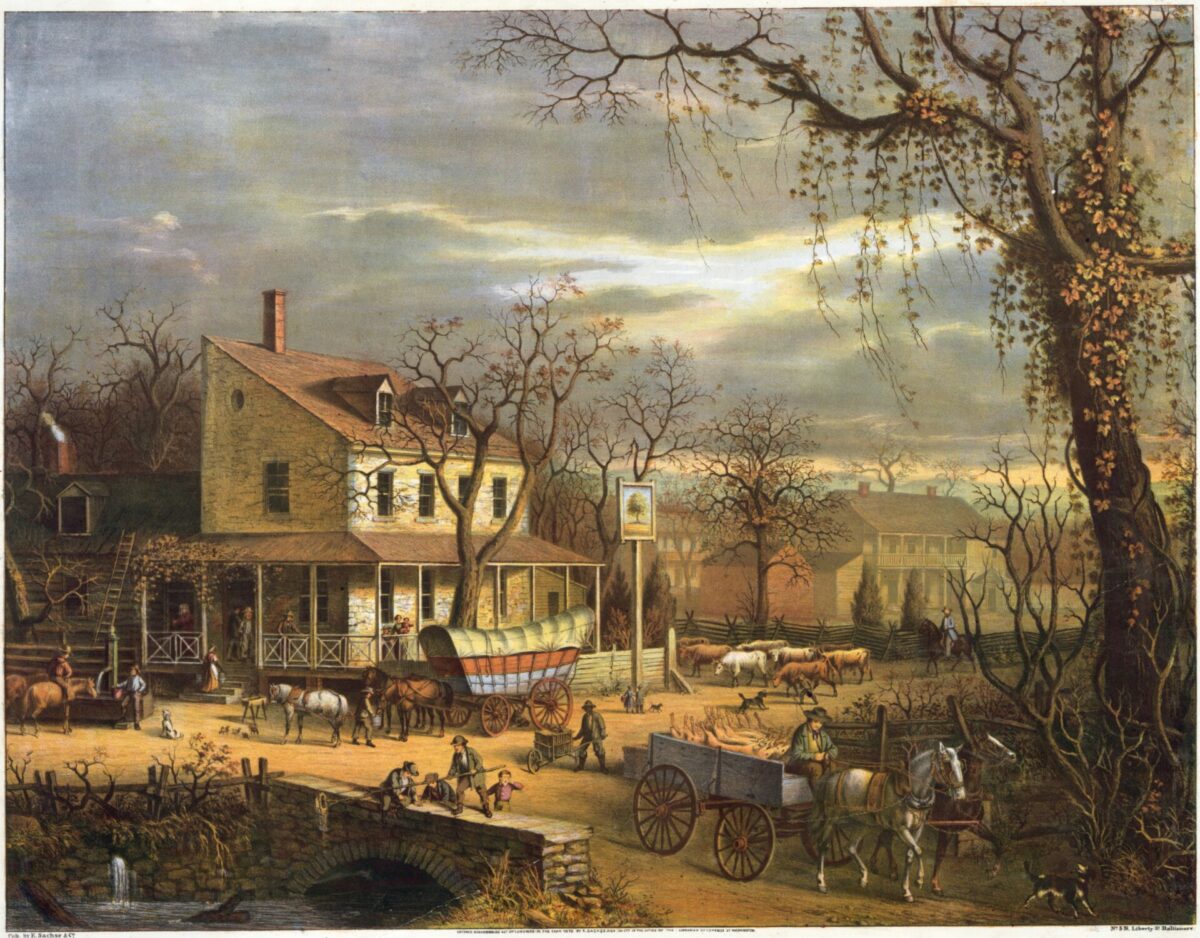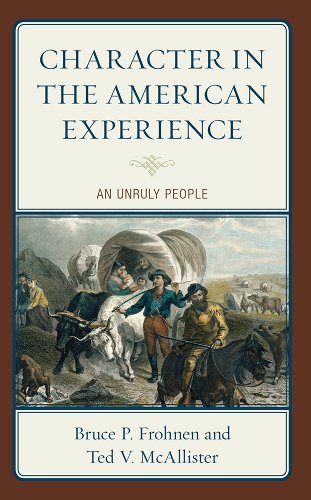“What makes us American?” starts off Bruce P. Frohnen’s and Ted. V. McAllister’s Character in the American Experience. According to the authors, it is neither blood nor ideology but the stories we tell to ourselves that makes us a people. Stories of founding, conflict, and cooperation shape who we are and the communities in which we live. It is a continuous conversation among interlocking and overlapping relationships and loyalties that “have existed within a culture shaped by competing religious visions and a sense of our own character dominated by differing dispositions.”
Bruce P. Frohnen, a professor of law at Ohio Northern University, and late Ted A. McAllister, the Edward L. Gaylord Chair and professor of public policy at Pepperdine, are well-equipped to tell this story of stories. Both have published works in American political thought, law, and policy, and they are sympathetic to the local over the national in the organization of our life. The story of the American character is a fitting tribute especially to McAllister’s career as this topic reflects his professional interests as a political scientist.
Since World War II, Americans have been confronted with what Frohnen and McAllister calls the “endangered self”: the “fully mature person equipped with an unshakable moral constitution still served as the model for the American citizen.” From Riseman’s “the lonely crowd” to today’s “intersectionality,” the American self has been questioned and deconstructed by scholars and activists for the past four generations. Underneath this concern is the more serious question whether the sources for forming an endangered self—institutions such as the school, family, and church—still exist.
According to Frohnen and McAllister, the story of the American has swerved between radical individualism and collective statism, with neither being desirable nor true. The fully mature person is an individual but rooted in a community: a person who is “unruly” but constrained by the primary institutions of his or her community. Thus, the American is less about a vision of a comprehensive politics than a story or “understanding of the kind of people we expected ourselves to be.”
In their analysis of colonial America, Frohnen and McAllister adopt David Hackett Fischer’s Albion’s Seed to understand the roots of American culture as four distinct people and stories: the Puritans and their devotion to a community bounded by conscience; the Virginians who established oligarchic rule; the Quakers who instituted the principles of toleration and religious freedom; and Scot-Irish who were suspicious of elites and preferred individual liberty over communal goods. Frohnen and McAllsiter add to these stories the sin of slavery which became—and in some ways still is—the greatest threat to “the American Republic.” The story of Americans as a free people is permanently tainted by its slave society and the subsequently attempts to wrestle with this contradiction that still haunts us today.
Besides these stories of cultural identities, Frohnen and McAllister also include the stories of the colonies and states as well as the Constitutional Convention which created one story out of many. The Constitution served as a civil religion for all Americans that bound them together as a single people, with George Washington being the model citizen for all Americans. Although these national examples serve to the unite the people, it was not at the expense of the local stories of the states and other communities. Both stories existed in parallel with one another and were institutionally manifested in the arrangement of federalism.
In addition to the Constitution and Washington’s life, there also are constant undercurrents in the American character that were observed by Alexis de Tocqueville. Frohnen and McAllister examine what they think are the most important from Tocqueville’s Democracy in America: self-government at the local (town) level and the moral authority of American women. According to Frohnen and McAllister, both have been instrumental in shaping the American character as an unruly but self-governing people and both are under threat with the rise of individualism, which is a withdrawal from society and a tendencyTocqueville believed was endemic in democracies.
Frohnen and McAllister continue their account of American stories that include the Civil War, Reconstruction, the westward expansion (which includes the 1899 Oklahoma land rush), the populist and progressivist movements, the “lost” generation, the baby boomers, the civil rights movement, and the 1960s radicalization of culture and institutions. In these stories Americans are constantly changing their expectations of what sort of people they wish to be, swaying between individualism and collectivism and, at times, finding the golden mean to govern themselves as a mature and serious people.
As Frohnen and McAllsiter point out, we live in the aftermath of the 1960s counter-culture revolution with a progressive culture and elite rule from both the Left and the Right. The irony of today’s American character is “a free republic requires instinctive adherence to the rule of law, but no law, no constitution, can protect a people’s liberties if they are not willing and able to fight for them.”
If we wish to devote ourselves to self-rule, then Frohnen and McAllister call for us to refuse to
comply with administrative systems and rules that compel us to act, believe, assert, or merely comply against our standards and judgement. Resisting both the bland administrative apparatus and the vocal mobs and choosing self-respect and honor over a servile and comfortable life. These are the acts of a free, honorable, self-governing people.
And what should replace the dictates of the administrative state for Frohnen and McAllister? It is the standards of public conduct from our local communities which provide Americans “real, concrete freedoms for each person, as well as for common respect and, most important, the fellow feeling and common way of life emanating from overlapping communities and interpersonal relationships.”
While I am sympathetic with this project, it seems to raise questions rather than provide answers. First, what aspects of the federal administrative state would Frohnen and McAllister wish to disappear? These are never specified in the book. Are there not some tasks that we need the federal government—or even global institutions—to address? The answer to me seems to be yes, especially with significant changes in the technologies of communication, transportation, warfare, and the biological and environmental sciences. Do we really want the administrative state to have no or an extremely limited regulatory role in these industries?
Second, and more importantly, Frohnen and McAllister fail to provide a reason why we should prefer our local stories and communities over national ones. One could argue that Americans identifying primarily with the national community enables the country to a global player and is a fulfillment, not a betrayal, of our democracy. It is assumed but not argued why localism is preferable to nationalism or cosmopolitanism. Such a case needs to be made to complete their story of the American character.
Despite these questions, Character in the American Experience is worth reading to reacquaint Americans with both the national and local stories we tell ourselves. In this age of media fragmentation and scholarly specialization, this book is a welcome antidote in narrating the story of our country from its founding to today. What we discover is that we always have been an unruly people, from the very beginning. It is a fact that gives us hope that our current disagreements and fights are not signs of our democracy’s weakness but its enduring strength.




1 comment
Martin
So they’re saying that “endangered” is actually a characteristic of the mature self, not merely a condition indicating its possible extinction as an element of society?
The term “unruly” harks back to Woodrow Wilson overcoming what he saw as the “waywardness of individuals” by concocting a consensus for ww1. He appointed George Creel as our first minister of propaganda, officially the head of the Committee for Public Information. The peaceful ending of the hit movie Civilization was re-filmed to show Woodrow and Jesus supporting the war that the presidential candidate had promised to keep us out of.
Thus began a pendulum swing toward trust in Big Government and less confidence in one’s moral authority as a mature individual.
Comments are closed.